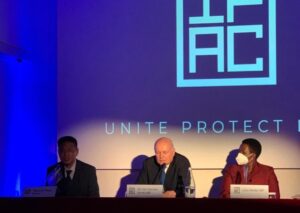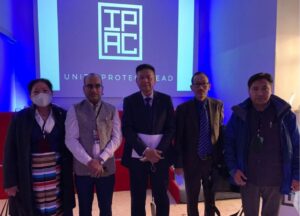 Sikyong Penpa Tsering, President of the Tibetan Government-in-Exile, has accused China of hypocrisy and firmly called out China’s unlawful actions against the Tibetans, Uyghurs, Taiwanese and Hong Kongers. He was speaking at the IPAC conference, held ahead of the G20 Summit*which is taking place in Rome as we go to press. So what is the G20, what is IPAC, and where does Tibet come into the story?
Sikyong Penpa Tsering, President of the Tibetan Government-in-Exile, has accused China of hypocrisy and firmly called out China’s unlawful actions against the Tibetans, Uyghurs, Taiwanese and Hong Kongers. He was speaking at the IPAC conference, held ahead of the G20 Summit*which is taking place in Rome as we go to press. So what is the G20, what is IPAC, and where does Tibet come into the story?
The G20 – the Group of Twenty – is the international forum that brings together the world’s major economies. Its members account for more than 80% of world GDP, 75% of global trade and 60% of the population of the planet.The forum has met every year since 1999 and includes, since 2008, a yearly Summit, with the participation of the respective Heads of State and Government.
Ahead of this year’s Summit, October 29 saw a gathering of 200 global parliamentarians, diplomats and experts at the conference of the Inter-Parliamentary Alliance on China (IPAC)**, also held in Rome. IPAC staged a counter-meeting ahead of the G20 Leaders’ Summit to demand a tougher stance towards the Chinese government.
IPAC invited Sikyong to speak, along with representatives of other countries living under Chinese rule. IPAC issued a press release saying “The conference […] will see parliamentarians from five continents meet with prominent leaders of groups targeted by the Chinese government, including Taiwanese Foreign Minister Joseph Wu, Sikyong of the Central Tibetan Administration Penpa Tsering, former Hong Kong legislator Nathan Law and Uyghur artist and activist Rahima Mahmut.” IPAC says the Alliance is now the “world’s largest China focussed network of international legislators”.

Sikyong Penpa Tsering with Representative Chhimey Rigzen of the Tibet Bureau Geneva and Secretary Karma Choeying of Department of Information and International Relations, CTA.
Photo: IPAC
Speaking to the Conference, Sikyong said, “For the G20 members of the democratic countries, it is not enough to have freedom in your own countries since the entire world is an interdependent community of human beings. It is paramount that you ensure the values you cherish in your countries be available to those ruled by authoritarian ones like the Chinese government,” He also appealed to the members to discuss the climatic issue facing the Tibetan Plateau and emphasised Tibet’s contribution to the major rivers in Asia. He said China must be strictly called out for its attitude against climate change. He said that China is the “principal stakeholder in the global disharmony”.
At the IPAC conference parliamentarians from 22 countries signed a pledge to “advocate on behalf of persecuted groups at risk of extradition to the People’s Republic of China and Hong Kong: The government of the People’s Republic of China (PRC) is carrying out a global campaign of threats and intimidation against Uyghurs, Tibetans, Hong Kongers, Chinese dissidents and other activists abroad. Those extradited or deported to the PRC will not face a fair trial and are at severe risk of persecution, arbitrary detention and torture. We, as legislators from across the world, pledge to advocate on behalf of all those facing extradition or deportation to the PRC based on their ethnic, religious or political status or activities, and call on our governments to put a stop to all attempts to harass and intimidate these groups in our jurisdictions.”
*Rome is hosting this year’s G20 Summit on October 30 and 31 – gathered there are the G20 Heads of State and Government, their counterparts from invited countries, and representatives of some of the main international and regional organisations.The Summit is the climax of the G20 process and the final stage, at Leaders’ level, of the intense work carried out throughout the year.
**The Inter-Parliamentary Alliance on China is an international cross-party group of legislators working towards reform on how democratic countries approach China.It is made up of global legislators and led by a group of co-chairs, who are senior politicians drawn from a representative cross-section of the world’s major political parties.
IPAC’s website says, “Developing a coherent response to the rise of the People’s Republic of China (PRC) as led by the Chinese Communist Party is a defining challenge for the world’s democratic states. This challenge will outlast individual governments and administrations; its scope transcends party politics and traditional divides between foreign and domestic policy […] When countries have stood up to Beijing, they have done so alone. Rather than mounting a common defence of shared principles, countries have instead been mindful of their own national interests, which are increasingly dependent on the People’s Republic of China for crucial minerals, components, and products.No country should have to bear the burden of standing up for fundamental liberties and the integrity of the international order by itself.”




 Print
Print Email
Email